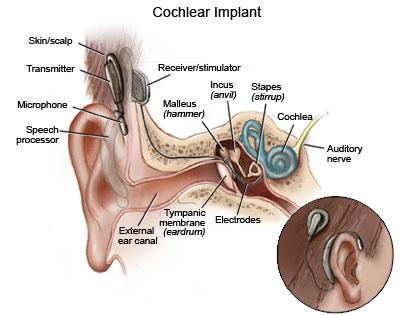Cochlear Implant
Cochlear Implant
What is the cochlear implant surgery?
A cochlear implant is an electronic device that partially restores hearing. It can be an option for people who have severe hearing loss from inner-ear damage who are no longer helped by using hearing aids.
Adults and children who are as young as six to 12 months old can benefit from cochlear implants. People who have cochlear implants report improved
To be eligible for a cochlear implant, you must have
Hearing loss that is so severe it interrupts spoken communication
Limited benefit from hearing aids as determined by specialized hearing tests
No medical conditions or factors that increase the risks associated with cochlear implants
High motivation to participate in hearing rehabilitation and be part of the hearing world
Realistic expectations of what cochlear implants can and can't do for hearing
Risks of cochlear implantation Surgery
Loss of residual hearing. Implantation of the device can cause a loss of any remaining, unclear, natural hearing in the implanted ear in some people.
Inflammation of the membranes surrounding the brain and spinal cord (meningitis) after cochlear implant surgery. Vaccinations to reduce the risk of meningitis are generally given to adults and children before implantation.
Failure of device. Surgery may sometimes be needed to repair or replace a faulty internal device.

